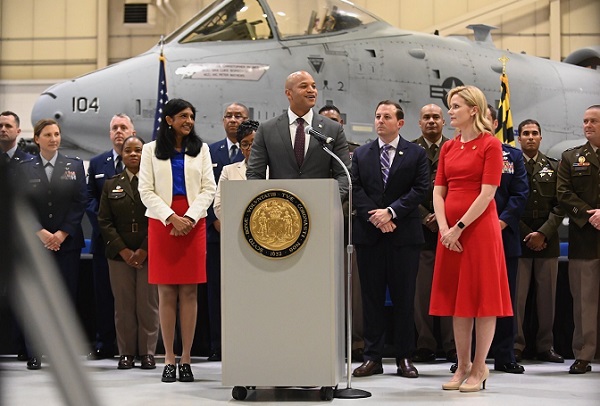MIDDLE RIVER, MD—Governor Wes Moore this weekend presided over the Moore-Miller Administration’s sixth bill signing at the Maryland Air National Guard’s 175th Wing in Middle River, signing the largest military tax cut for younger veterans in a generation and highlighting the administration’s commitment to strengthening the military and honoring veterans in Maryland.
“We need to support our military community because they make our state better—whether they are active duty, reservists, or veterans,” said Gov. Moore. “For Maryland to win this decade, we need to make Maryland the best state in the nation to serve in uniform and the best state in the nation to live after discharge. The legislation I signed today sets us on that path, and shows our commitment to bettering the lives of our men and women that have sacrificed so much.”
“Serving in our Armed Forces is one of the most courageous and selfless decisions a citizen of this country can make and we have a profound responsibility to them and their families when they return home to civilian life,” said Lt. Gov. Miller. “Through this legislation, the Moore-Miller administration is taking an unprecedented effort to help our veterans build their careers and their lives here in Maryland.”
Governor Moore also administered the Maryland National Guard’s Oath of Enlistment to Zion Rawls. Rawls is a Harford County resident who will serve as an aviation resource manager for the Maryland Air National Guard.
The governor also commemorated Military Spouse Appreciation Day. Governor Moore presented the bill signing’s first pen to Senator Dawn Gile (MD-District 33), whose husband, Army Sergeant Major D.J. Gile, recently retired after serving in the military for 24 years.
Included among Governor Moore’s champion pieces of legislation signed today are:
H.B. 554/S.B. 553, Keep Our Heroes Home Act, increases the military retirement income tax exemption for veterans, spouses, or anyone receiving military pensions in Maryland. The exemption will be increased from $5,000 to $12,500 for individuals under the age of 55 and from $15,000 to $20,000 for individuals over the age of 55.
H.B. 553/S.B. 554: Health Care for Heroes Act of 2023, establishes the Tricare Premium Reimbursement Program within the Maryland Military Department. The program will provide members of the Maryland National Guard who utilize the DoD-provided Tricare Reserve Select health care plan and the Tricare Dental Program up to $60 in reimbursements monthly to cover the costs of premiums. This $60 is enough to cover the full individual costs for health care and dental care.
H.B. 480/S.B. 286: Department of Veterans Affairs – Burial in State Veterans’ Cemeteries – Spouses and Dependents, requires the Department of Veterans Affairs to bury the eligible spouse or dependent of a veteran in a State veterans’ cemetery without charge.
H.B. 316/S.B. 354: Income Tax Checkoff – Maryland Veterans Trust Fund, establishes a certain income tax checkoff for voluntary contributions to the Maryland Veterans Trust Fund. This legislation also requires the Comptroller to include certain information in each individual income tax return package.
H.B. 1162: Study on the Utilization of the Expedited Licensing Process for Service Members, Veterans, and Military Spouses, requires the Maryland Department of Labor, in consultation with the Department of Veterans Affairs, to conduct a study on the utilization of the expedited licensing process for service members, veterans, and military spouses for certain occupational and professional licenses in the State. This legislation requires the Maryland Department of Labor, in consultation with the Department of Veterans Affairs, to report its findings and recommendations to the Governor and the General Assembly by June 30, 2024.
H.B. 726/S.B. 231: Maryland Medical Assistance Program – Autism Waiver – Military Families, requires, unless the child’s family requests that the child be removed, that a child on the registry for the Autism waiver remain on the registry if the child’s family relocates out of the State for military service. If a child on the registry for the Autism waiver becomes eligible for services while the child’s family is out of the State for military service, the child shall be eligible for services through the waiver if the family relocates to the State.
A complete list of bills signed into law is available online here.

